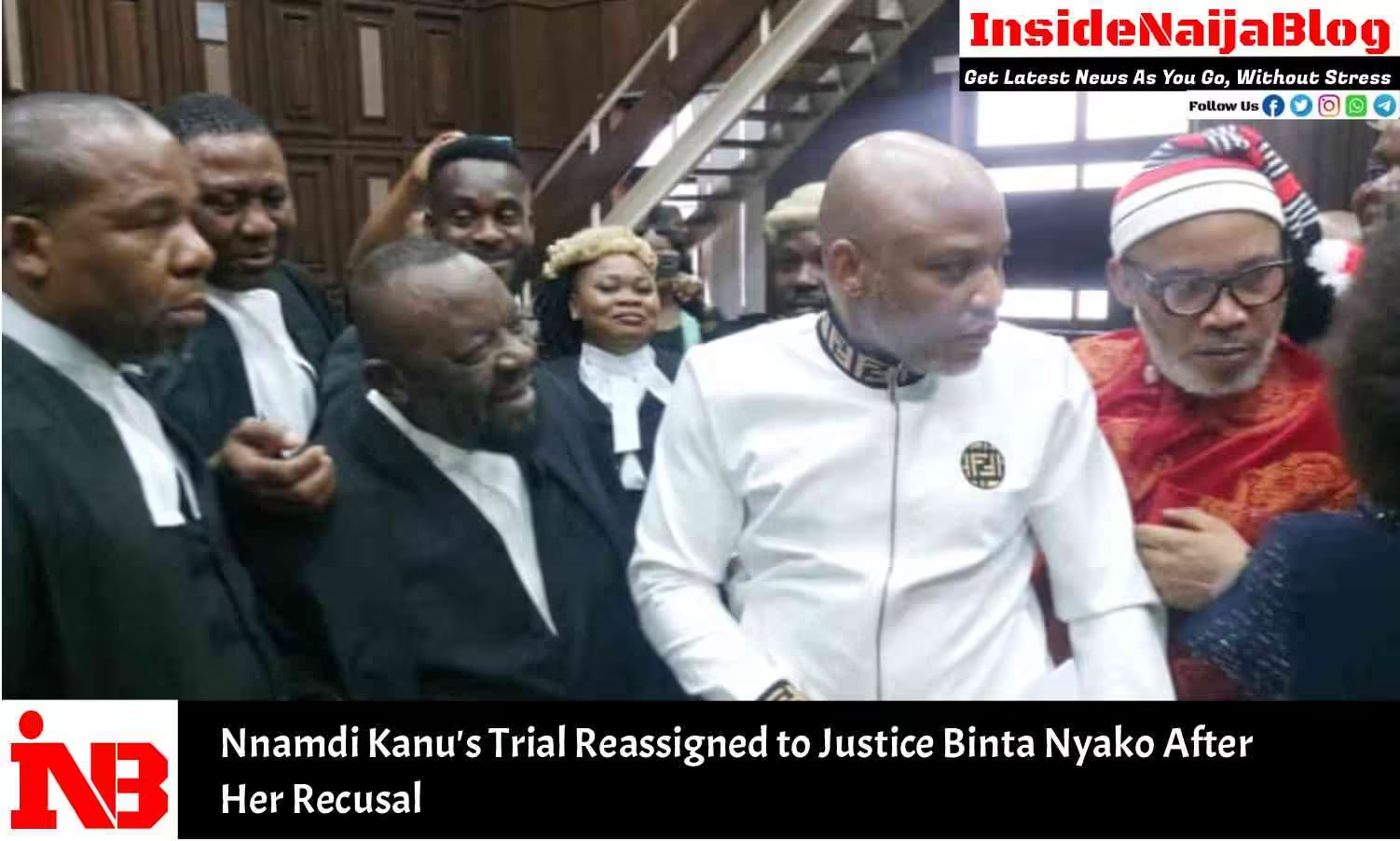The Chief Judge of the Federal High Court (FHC), Justice John Tsoho, has reassigned the Federal Government’s case against Nnamdi Kanu, the leader of the Indigenous People of Biafra (IPOB), to Justice Binta Nyako. This decision comes after Justice Nyako had previously recused herself from the trial on September 24, following an oral request made by Kanu and his lawyer, Aloy Ejimakor.
Background on the Recusal
Justice Nyako had removed herself from Kanu’s trial due to the defendant’s lack of confidence in her handling of the case. During a recent court session, Kanu interrupted his lawyer, Ejimakor, and expressed frustration with the court’s proceedings. He accused Justice Nyako of not following the Supreme Court’s rulings regarding his fundamental rights, particularly concerning his access to legal counsel. Kanu openly requested that Justice Nyako step down from the case, stating that he no longer had faith in her court. Nyako, surprised by Kanu’s behavior and accusations, decided to recuse herself, stating that it was improper to continue with a trial when the defendant had no confidence in the court.
However, a reliable source from the FHC has informed the News Agency of Nigeria (NAN) that the Chief Judge has reversed her decision and returned the case to Justice Nyako. The reassignment is based on the condition that Kanu must formally file a motion on notice, presenting reasons for why he does not want to stand trial before Justice Nyako. This motion would be served to the Federal Government through the Office of the Attorney-General and Minister of Justice for their response.
History of the Case
Nnamdi Kanu’s trial has been complex, with multiple judges presiding over the case before it was initially assigned to Justice Nyako. Justice Ahmed Mohammed and Justice Tsoho (before he became Chief Judge) both handled Kanu’s case but were rejected by the defendant. The matter was then transferred to Justice Nyako.
During a recent court session, the prosecution, led by Adegboyega Awomolo, SAN, was ready to proceed with the continuation of the trial. However, Ejimakor requested an adjournment due to two pending appeals challenging the court’s jurisdiction. Awomolo argued that the trial should not be stalled because of the appeals and that the defense should have sought a stay of proceedings from the appellate court. Justice Nyako, in response, stated that no applications would be entertained until the trial concluded and urged both parties not to delay proceedings.
Despite this, Ejimakor argued that Kanu had not been given adequate time to prepare his defense, accusing the court of not enforcing orders allowing his client the necessary access to legal counsel. This dispute led to Kanu’s outburst in court, where he angrily instructed Ejimakor to stop speaking and demanded Justice Nyako recuse herself, citing the alleged violation of his rights.
The Supreme Court’s Role
During the hearing, Kanu referenced a Supreme Court decision, claiming that the court ruled in his favor regarding his rights. However, the prosecution disagreed. Awomolo argued that Kanu had misinterpreted the Supreme Court’s ruling. He asserted that the apex court had not ruled in favor of halting the trial but had rather instructed the lower court to proceed with the case. Awomolo called Kanu’s claims “incompetent and audacious,” stating that they did not reflect the actual Supreme Court judgment.
Justice Nyako expressed her disbelief that Kanu would shout at his lawyer and accuse the court of disobeying a Supreme Court order. She stated that the Supreme Court’s decision did not align with Kanu’s interpretation and decided to step down from the case out of respect for the defendant’s request. Nyako remarked that she could not preside over a trial where the defendant had lost faith in the judicial process.
What Happens Next?
With the case reassigned to Justice Nyako, Kanu’s legal team is expected to formally file a motion detailing why he does not wish to continue his trial under her supervision. Once the motion is submitted, the Federal Government, represented by the Attorney-General’s office, will have an opportunity to respond. Both parties will present their arguments in court, and Justice Nyako will then decide whether she will continue overseeing the case or step down permanently.
This reassignment may lead to further delays in Kanu’s trial, which has already seen several postponements and legal complexities. The case has garnered widespread attention due to Kanu’s leadership of IPOB, a group advocating for the independence of Biafra from Nigeria, and the broader implications of his trial for national security and political stability.
Key Points
- Case Reassigned: Justice Binta Nyako will once again preside over the Federal Government’s case against Nnamdi Kanu, pending a formal motion from Kanu’s legal team.
- Kanu’s Objections: Nnamdi Kanu expressed frustration with the trial process and accused Justice Nyako of ignoring the Supreme Court’s rulings.
- Supreme Court Misunderstanding: Kanu’s claims about the Supreme Court’s judgment were disputed by the prosecution, which argued that the court had mandated the continuation of the trial.
- Next Steps: The court will address Kanu’s request once it is formally presented, and a decision will be made on whether Justice Nyako will continue with the trial.
This case remains a focal point in Nigeria’s legal landscape, with implications for both the judiciary and the ongoing political tensions surrounding the IPOB movement.



